Flood Preparedness Guide
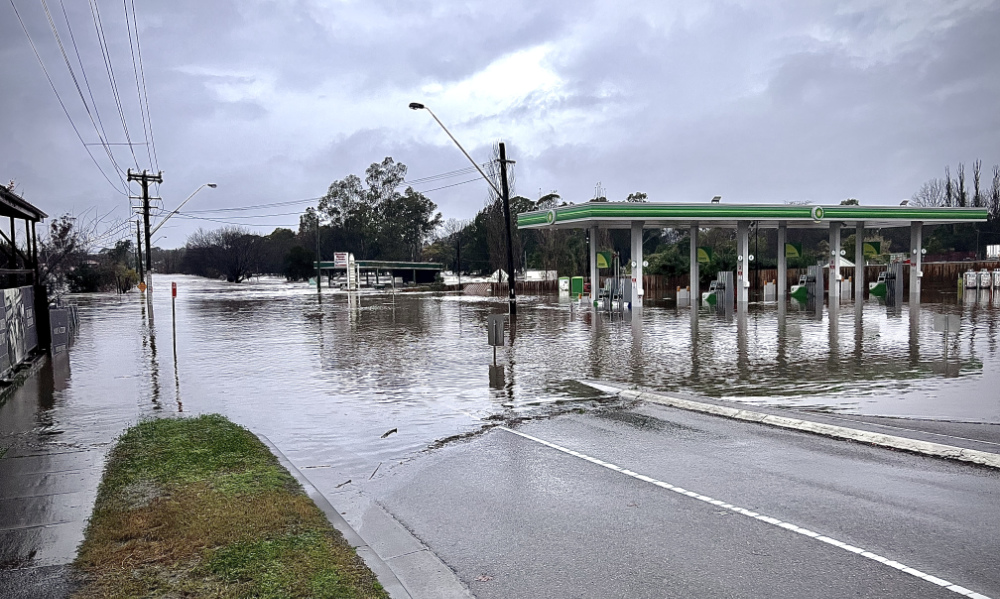
Flooding can be an extreme natural disaster that leaves homes cut off from the outside world for extended periods of time. If you live in an area where this is a possibility then it is wise to ensure you have done everything you can to prepare for a situation like this. Now that doesnt mean you need to end up with a bunker full of canned food and weapons like you may have seen on some TV shows. There are plenty of simple things you can do to prepare for a flood and luckily a lot of them are just as useful in a fire or other natural disaster as well. So read through this guide and you may come across something that you have previously overlooked and you may find there are things you have already done or are planning to do that would be extremely helpful.
Water
Obviously in a flooding situation water is likely to be plentiful, but water that is safe to drink is not so you will need to have a safe water source as a backup. It is important to have some separately bottled water even if you are on tank water just in case your tank is compromised, which could happen as a result of the flooding or even a power outage that takes out your pump. You don't need to spend a lot of money doing this, you can fill up and store drums from your primary water source.
Another option is to have a reliable method of purifying water, this can be done by boiling or filtering. Boiling does require a significant amount of energy which you can get from electricity, gas or even burning firewood. Filtering is the most reliable solution as you only need a decent filter system and the rest of the work is done by hand.
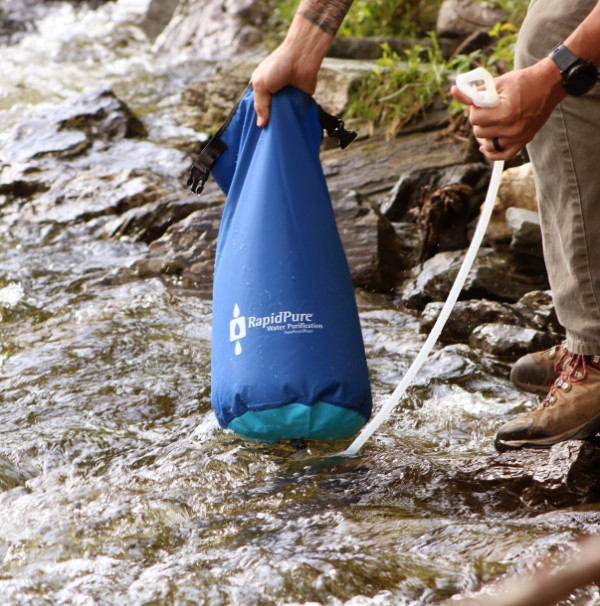 |
||
|
Check out the Trail Blazer Water Purification System for a quick and easy solution to provide clean drinking water for your entire family. |
|---|
Food
As we know, food is not always an immediate priority in a survival situation, a healthy adult can survive several weeks without eating, but this isn't true so much for smaller children or some people with compromised health. Also it's not really a comfortable thing to go without food for extended periods and it does take a significant toll on even a healthy body and mind which could be the difference between making the right or wrong decision in an emergency and could lead to catastrophe. If done correctly you can easily store up enough food for a few weeks without needing any more storage space than your normal kitchen/pantry space.
The sky's the limit with how much you want to store but the more you have the more of a chore it is to maintain, it helps to find a good balance so you don't end up having to throw out a whole bunch of expired food. Grab a few extra cans and a bag of rice at the supermarket each week and you will have an extra 2 weeks of food stored up faster than you think.
If you are relying on electricity to cook your food then make sure you have a backup option just in case the power goes out, even a small gas camping stove or your regular BBQ can be useful here as long as you have enough gas for them.
Medications
This is something that can easily be overlooked when you are able to head down to the chemist the same day your last prescription runs out, but that could be a costly mistake in an emergency so make sure you head in for a refill at least 2 weeks before your current supply runs out and if you can afford it then keep even more stocked up, we have seen significant worldwide shortages of many different products over the past few years so it would smart to keep a large buffer when it comes to essential life saving medicines, most (but not all) medicines are good well past their use by dates so do a bit of research or your particular ones to make sure they will still be effective if the are out of date and you should also make sure to cycle through your oldest stock when you get a new prescription filled.
Power
Throughout history we can see significant jumps in quality of life whenever a new power source becomes widely available, this is most evident with the introduction of electricity. If any modern home is not prepared to run without it then it will quickly become very uncomfortable if it is cut off for just a few days let alone weeks. We can mitigate this potential loss of power in several different ways.
Solar Power
Solar power is one of the most reliable ways to provide backup power that is equivalent to the grid power that has been cut off, although in order for it to be most useful you will need to have your solar power hooked up to a battery system to store the power for use when needed, this will also help when there are days with less sun which is likely to be the case if you are dealing with a flood. The other added bonus is the cost saving you will have year round and reduced dependency on the grid that can go down at any time.
Generator
Generator power is a tried and tested method that with the right equipment can provide as much power as you need, there are some downsides such as the requirement to store significant amounts of fuel to keep the generator running and the potential for breakdowns. For this reason I think it is best to have a solar/battery system with a generator backup that is able to top up the battery bank when there are low sun days, this will mean a lower requirement for stored fuel as well as less stress on the generator and therefore a reduced likelihood of breakdowns.
Lighting
Being able to light up the dark is extremely useful if you want to get anything done between sunset and sunrise, it's also essential if you want to survive an emergency situation at night. There are a huge range of portable LED lighting options available, make sure to keep your rechargeable batteries charged and the disposable batteries stocked up. Lanterns are extremely useful when trying to light up rooms inside the house and headlamps are the best option for any outdoor work as they both allow you to keep your hands free while performing essential tasks. LED lighting is the most efficient and reliable way to get the job done but you can supplement this with other sources such as candles or oil lamps.
| The Oztrail Lumos 700 Lantern is a great way to be prepared with some backup lighting, it can even be used as a power backup for your USB devices with the built in power bank function. | 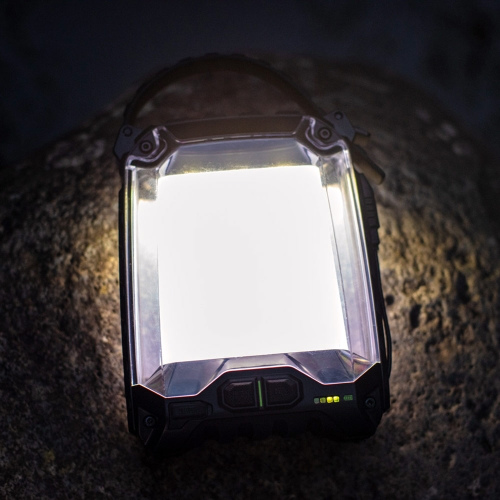 |
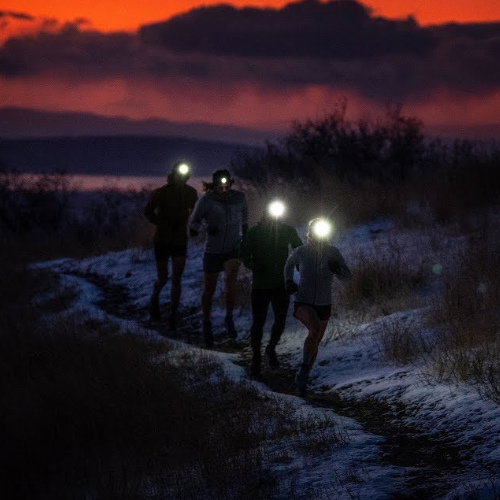 |
The Black Diamond Sprint Headlamp is a great lightweight rechargeable headlamp with an excellent balance of power and battery life, it can be charged from any USB port. |
Heating & Cooling
Heating and cooling is one of the most difficult things to do without power and it is even difficult to do if you are running with reduced power capacity as will likely be the case unless you have a fully off grid rated set up. But luckily there are several ways we can prepare for this. Obviously there are a huge range of climates around Australia and there will be some areas with no need for cooling and others with no need for heating.
Thermal Efficiency
The single most effective way to provide a comfortable environment is to remove the need for power in the first place, this does require a lot of prior planning that is ideally done at the design stage of your home but there are certainly ways to improve the thermal efficiency of any home. You can do things like adding insulation, upgrading windows and sealing up draughts.
Wood Fire
Fire has always been and remains essential for human life to thrive on earth. A wood fireplace is great insurance against a loss of power, just don't forget to keep stocked up with some well seasoned firewood along with a whole lot of lighters, matches and fire starters. A nice freestanding fireplace can also be used for cooking and boiling water making it extra useful.
Cooling
Cooling is something that is difficult to do without using large amounts of power, so you should concentrate on maximising your home insulation and that will mean you are able to run an air conditioner for less time with the house remaining cooler for longer.
Communication
Being able to communicate with the outside world is extremely handy if you are cut off by flooding and can be a life saver in an emergency. There are many methods of communication with the most useful ones being electronic so be prepared with batteries and back up power sources to keep them running.
Mobile Phone
In normal times a mobile phone is generally very reliable and should be the thing you check first, unfortunately if the local phone towers are out then they are pretty close to being useless.
2 Way Radio
2 Way radios are a world all of their own, they can range from a simple handheld CB radio to extremely complicated HAM radio setups that can reach all around the world. A very efficient option is to have a CB radio set up in your vehicle, this can be connected to a large antenna which will give it a lot more range than a handheld radio even if they are both rated at the maximum 5 watt power output that is allowed without a licence and as a bonus it's something you may find useful in normal times when there is no emergency.
AM/FM Radio
A basic AM/FM radio can be a great way to receive information from the outside world if you are cut off, even if you can't communicate with them you will be able to get more information such as weather forecasts and damage reports for your local area.
First Aid
Medical care is something that can often be taken for granted when the hospital is just an ambulance ride away. Make sure you have a well stocked first aid kit and also that you are trained in how to use it, there are many first aid courses out there so find one that is local and book it in, or put your hand up next time they are offering first aid training at work.
 Make sure you always have a Snake Bite First Aid Kit on hand. Proper application of a compression bandage is made easy with the Aero indicator bandages and it can save a life Make sure you always have a Snake Bite First Aid Kit on hand. Proper application of a compression bandage is made easy with the Aero indicator bandages and it can save a life |
||
|---|---|---|
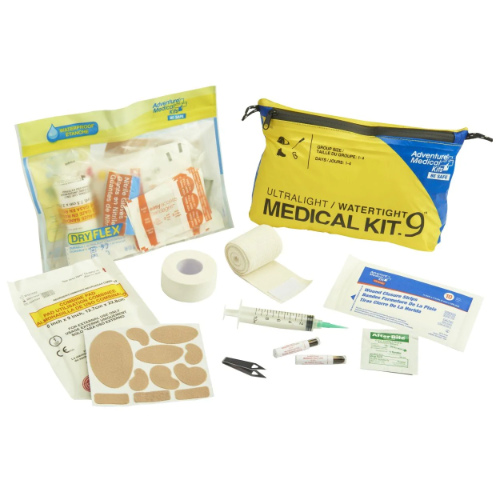 A well stocked First Aid Kit is an essential item that you should keep in every home and vehicle. A well stocked First Aid Kit is an essential item that you should keep in every home and vehicle. |
Tools and Repairs
You could have an amazing generator and solar setup but it won't do you any good if it breaks down and you don't know how to fix it. There are endless online resources available to you so dive in and learn as much as you can about Electrical, plumbing, engines, construction and anything else you might find useful. Make sure you have all the right tools and the spare parts you might need. Just don't go in too far past your skill level, it's better to go a few days without power than being electrocuted or burning down the house. It is a great ideo to keep printed manuals and resource books that can't be lost to a faulty hard drive or a power loss.
Flood Mitigation
If your house is in an area that is likely to be overwhelmed with water rather than cut off from access then you may need to take a different approach. Stock up on sandbags and be prepared to evacuate at a moment's notice if required.
Security
The unfortunate fact of life is that whilst most people are inherently good, there are always some that are bad and history has shown that victims of natural disasters are prime targets for criminals who will take advantage of the situation to loot houses when they think everyone has been evacuated, it is likely that just your presence at your home will deter a lot of criminals but it is possible that knowing you are cut off from the outside world including ALL emergency services may embolden some criminals so you should try everything you can to avoid a confrontation but be prepared to defend yourself if there is no other option.
Lock It Up
Make sure all of your locks are in working order and if possible make sure your property perimeter is secure, put locks on the gates and repair any damaged fences.
Weapons
The most useful weapon may be the mind but there are some situations where it takes a sword to get the job done. It is likely that if somebody is emboldened enough to rob or attack an occupied property in a natural disaster that they will be carrying some kind of weapon, so you should be prepared to respond in kind.
Weapons can be as simple as a stick or as complex as a gun. You will likely have plenty of items around that can be repurposed in an emergency situation, a broomstick becomes a spear, a knife becomes....... Well, a knife, you get the idea. Australia's gun laws are quite restrictive and owning guns for the purpose of defending yourself is not recognised as a legal purpose, but if you are a target shooter or a hunter and you have them available to you then it would be reasonable to use them to defend yourself from an attacker in the home in a life or death situation, the much more likely scenario is they would be scared off very quickly and you would avoid the need for any immediate confrontation.
